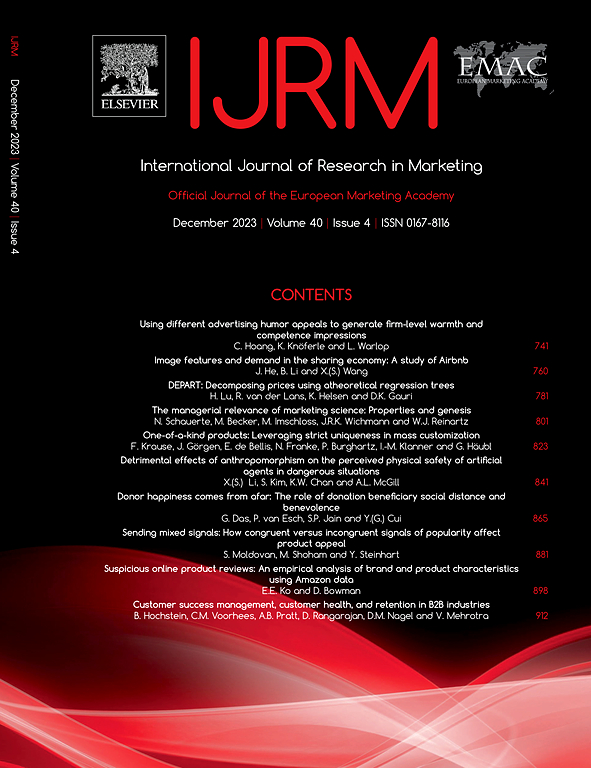The impact of nutrition claims on purchase behavior for food products
IF 7.5
2区 管理学
Q1 BUSINESS
International Journal of Research in Marketing
Pub Date : 2025-09-01
DOI:10.1016/j.ijresmar.2024.11.001
引用次数: 0
Abstract
Faced by increasing emphasis on health, manufacturers try to persuade consumers by using nutrition claims on their packaging. Although experimental research suggests that such claims influence consumer behavior in different ways, it remains unknown whether and to what extent they have an effect in actual grocery situations with large amounts of information to process. In this study, the authors investigate the effect of presence (stressing the presence of a healthy ingredient) and absence nutrition claims (stressing the absence of an unhealthy ingredient) on consumer purchase behavior using UK household scanner purchase data from 17 product categories during the years 2009–2012. They find that presence nutrition claims increase choice while absence nutrition claims decrease choice. Both types of nutrition claims do not influence the quantity purchased. Importantly, a nutrition claim’s effectiveness depends on SKU and category characteristics. Presence nutrition claims are more effective in healthy categories, and absence nutrition claims for SKUs with fewer promotions. At the same time, both nutrition claims are less effective for higher priced SKUs and more effective for brands with higher advertising spending. Absence nutrition claims are more effective when fewer SKUs in the category have the same type of nutrition claim, but presence nutrition claims benefit when more SKUs have the same type of nutrition claim.
营养声明对食品购买行为的影响
面对对健康的日益重视,制造商试图通过在包装上使用营养声明来说服消费者。尽管实验研究表明,这种说法以不同的方式影响着消费者的行为,但在需要处理大量信息的实际情况下,它们是否会产生影响,以及在多大程度上产生影响,仍不得而知。在这项研究中,作者调查了存在(强调健康成分的存在)和不存在营养声明(强调不健康成分的存在)对消费者购买行为的影响,使用了英国家庭扫描仪2009-2012年期间17种产品类别的购买数据。他们发现,有营养声明会增加选择,而没有营养声明会减少选择。这两种营养声明都不会影响购买的数量。重要的是,营养声明的有效性取决于SKU和类别特征。存在营养声明在健康类别中更有效,而在促销较少的sku中缺席营养声明更有效。与此同时,这两种营养声明对价格较高的sku效果较差,而对广告支出较高的品牌更有效。当类别中较少的sku具有相同类型的营养声明时,缺席营养声明更有效,但当更多的sku具有相同类型的营养声明时,存在营养声明更有效。
本文章由计算机程序翻译,如有差异,请以英文原文为准。
求助全文
约1分钟内获得全文
求助全文
来源期刊
CiteScore
11.80
自引率
4.30%
发文量
77
审稿时长
66 days
期刊介绍:
The International Journal of Research in Marketing is an international, double-blind peer-reviewed journal for marketing academics and practitioners. Building on a great tradition of global marketing scholarship, IJRM aims to contribute substantially to the field of marketing research by providing a high-quality medium for the dissemination of new marketing knowledge and methods. Among IJRM targeted audience are marketing scholars, practitioners (e.g., marketing research and consulting professionals) and other interested groups and individuals.

 求助内容:
求助内容: 应助结果提醒方式:
应助结果提醒方式:


